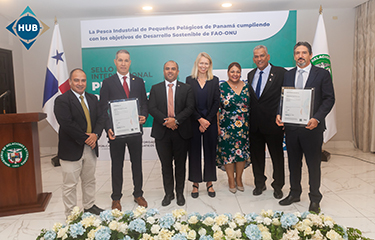First MarinTrust Improver Program member achieves full certification

The Panama small-pelagic fishery, the first fishery improvement project (FIP) to enter the MarinTrust Improver Program in 2015, has now passed the full MarinTrust fishery assessment and the fishmeal and fish oil production sites that have been sourcing from the fishery have achieved MarinTrust certification.
“This recognition is the result of more than seven years of hard work in the fishing sector and an indication that our nation guarantees good practices in the industry, consolidating investments that focus their strengths on consistent improvements, in the short and medium term, aligned with the interests of conscientious consumers committed to nature around the world," Panama ARAP (Fishery and Aquatic Resources Authority) General Administrator Flor Torrijos said. "This achievement that we obtain today goes hand in hand with the regulations that promote the protection of marine species, in balance with sustainable fishing activity that generates wealth, employment and a secure source of food. Panama demonstrates that it adapts to the demands of the 21st century’s society, adopts legislation that promotes the protection of marine resources and ensures compliance.”
The small pelagic fishery initiated its FIP in 2011, led by by the nonprofit CeDePesca. The FIP was run along with local seafood firm Promarina, and it is now run in conjunction with Procesadora Bayano, MarinTrust said.
“Back in the 2010s, the Panama small-pelagics fishery was data-poor, with inadequate records of effort or landings, and nothing known about its impacts on the ecosystem. The market had started demanding third party proof of sustainability, so something needed to be done,” CeDePesca Executive Director Ernesto Godelman said.
The FIP succeeded in digitalizing past catch information, implementing an onboard observer program, training crew members with strategies to release vulnerable species bycatch alive, and creating a new management plan that includes total allowable catches (TACs) to ensure stock numbers remain at sustainable levels.
“The fishery mainly targets Pacific anchovy and Pacific thread herring. Today, Europe buys the majority of the fish oil for use in the salmon feed industry, while China, North America, and countries neighboring Panama are the main market for fishmeal, which is used in swine, aquaculture and petfood diets,” Animalfeeds Managing Director and Leader of the Fishery Improvement Project Brian Murtagh said.
Animalfeeds has commercialized much of the fishmeal and fish oil production and has marketed Panamanian products since 1965.
In order to achieve the MarinTrust certification, the fishery site needed to pass a third-party audit, and will now require annual surveillance audits and recertification audit every three years.
“This thorough process ensures not only that marine ingredients come from non-IUU fisheries that are managed in accordance with the FAO code of conduct for responsible fisheries but also that production is carried out to high standards of safety and quality, with sufficient care given to the environment, workforce, and local community,” MarinTrust Impacts Manager Nicola Clark said.
As part of the MarinTrust Improver Program, the fishery could sell marine ingredients as MarinTrust Improver Program product, but once certified, can now use the MarinTrust certification and display that logo on the company product.
Photo courtesy of MarinTrust






Share